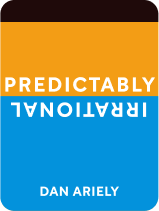

This article is an excerpt from the Shortform book guide to "Predictably Irrational" by Dan Ariely. Shortform has the world's best summaries and analyses of books you should be reading.
Like this article? Sign up for a free trial here .
How can you work to overcome the power of free? What positive impacts can the power of free have?
If something is “free,” it may cause you to make an irrational purchase, or to wait in a 45-minute line for it. But would you have really done those things if they weren’t free? Learn how to overcome the power of free and harness it for good.
Continue reading to learn more about the power of free.
Diminishing the Power of Free
The first part of diminishing the power of “free” is recognizing the ways it might be showing up in different aspects of your life. Keep in mind that it’s not only used to trigger irrational purchases. It can also be used to manipulate how you spend your time—you wouldn’t spend 45 minutes standing in line for ice cream unless it was Free Cone Day at Ben & Jerry’s or unless each ice cream came with a free t-shirt.
The second part is questioning how the presence of “free” might be affecting your decision. Take a step back and think:
- If this wasn’t free, what choice would I make?
- Would I be able to justify this purchase or time spent if the “free” part were eliminated?
Taking a moment to think consciously about why you might be making certain choices is a helpful step in interrupting the natural, yet irrational, reaction we have to free items—thus clearing the way for a more careful and rational analysis of what the best choice is.
The Positive Power of Free
It’s important to keep in mind that the power of “free” can be used toward positive outcomes if harnessed correctly. First, we’ll look at an example of how you can use it on a small scale in friendships, and then we’ll discuss how the power of free can drive social changes.
Dinner With Friends
Knowledge of humans’ natural positive reaction to “free” can help you strengthen the bonds of your friendship group—all you need to do is pick up the tab at your next outing.
Recall that nearly every transaction has the downside of having to spend money. If all of your friends need to chip in a bit for their portion of dinner, everyone at the table experiences this downside. However, the negative feelings associated with spending money only worsen to a certain point, and then plateau.
Imagine that every $20 spent is one unit of discomfort, and this discomfort plateaus around $60. If you and five friends went for dinner and each owed $20 at the end of the night, your group would experience a total of 6 units of discomfort. However, if you were to pay the entire bill yourself, you would only experience 3 units of discomfort and would spare the rest of your group any discomfort at all.
Ideally, another friend would have the responsibility of picking up the check at the next outing, and another at the outing after that. This continues the cycle of diminishing the downside of the transaction and thereby increasing the perceived value of the get-together, and it triggers the positive emotions that come with getting something for free.
Social Change, for Free
Another positive aspect of the power of “free” is its potential for getting people to participate in programs that benefit their communities, their health, or the environment. For example, to encourage more people to drive electric cars, you could add the influence of “free” to the purchase—such as in an offer for free emissions testing or free weekend parking in your city. Or, to encourage more people to get preventative medical exams, such as mammograms and colonoscopies, make these exams free. Reduced copays don’t spark the same amount of interest or motivation as zero-cost copays.

———End of Preview———
Like what you just read? Read the rest of the world's best book summary and analysis of Dan Ariely's "Predictably Irrational" at Shortform .
Here's what you'll find in our full Predictably Irrational summary :
- How logic is failing you on a daily basis
- How to identify your irrational behaviors
- Why getting something for free can cause you to make bad decisions






